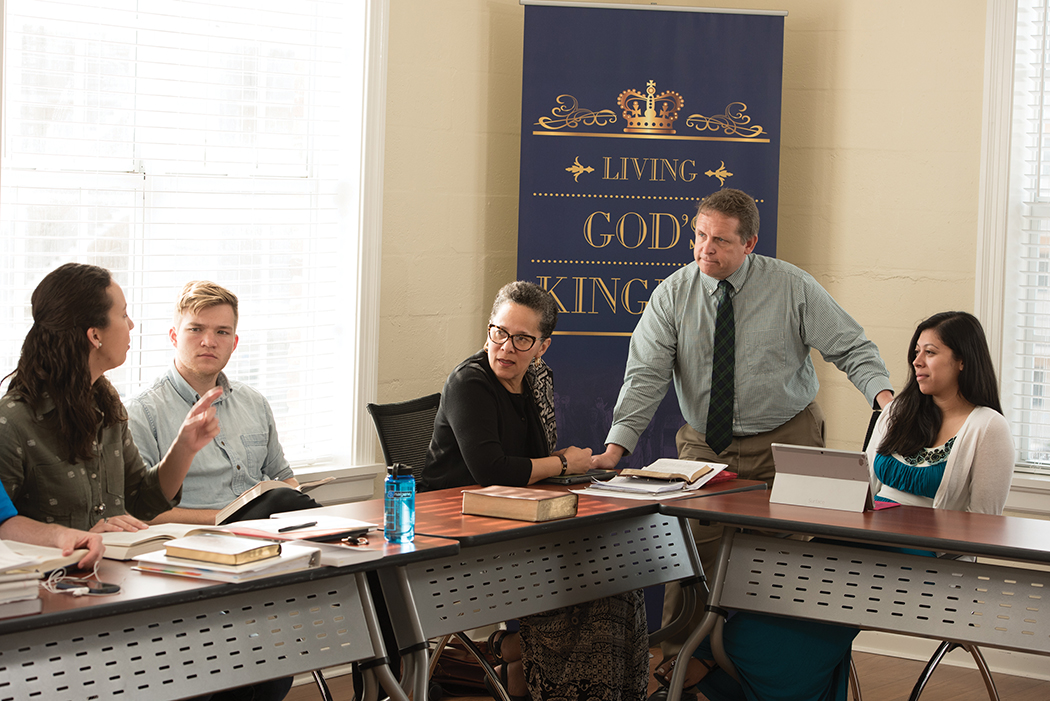 |
Jordan Massey, second from left, is a student in Palm Beach Atlantic University's five-year B.A./M.Div. program. Here he takes part in a class taught by Jonathan Grenz, associate professor of ministry leadership studies and director of the M.Div. program.
Credit: John McKeith |
Andrew Sparks of Naperville, Illinois, felt the first stirring of a call to pastoral ministry in the early days of high school.
“I was involved in a youth group in my church and was given an opportunity to lead small peer groups and lead worship,” Sparks says. “I had the sense it was something I had a knack for and was passionate about.” Church leaders and family affirmed his calling. “I was just growing in the sense that it was a good fit.”
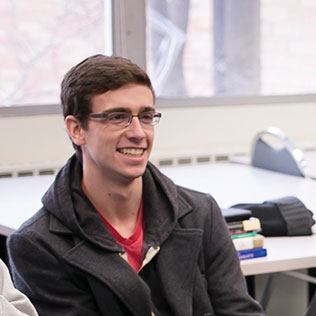 |
Andrew Sparks
Credit: Becca Spellman |
At 19, Sparks enrolled in an early entry M.Div. program at Trinity International University in Deerfield, Illinois. Designed especially for young people confident in their call to ministry, the program allows students to move directly from high school into a five-year bachelor of arts/master of divinity program. It begins with two years at the university’s undergraduate division of arts and sciences, Trinity College, with courses in general education and initial ministry. Next, a third year is shared between the college and the university’s seminary division, Trinity Evangelical Divinity School (TEDS). The fourth and fifth years are fully at TEDS.
“I was surfing the net and came upon the five-year program,” says Sparks. “It was only going to be one extra year beyond a typical bachelor’s, and I could receive a master’s at TEDS. There were some pretty good scholarship opportunities tied to it, which was also an incentive.”
Sparks is now 23 and in his final year of study.
Saving future clergy time and money are two of the main drives behind the Kern Family Foundation’s initiative to support colleges, universities, and seminaries as they develop five-year pastoral degrees. Today, thanks to research and start-up funding from Kern, 19 U.S. schools, including Trinity, have five-year programs, either up and running or in varying levels of development.
Each of the programs emphasize mentoring and spiritual formation while blending undergraduate education with graduate-level work that results in both a bachelor of arts degree and a master of divinity or other master’s degree in ministry.
Rationale behind the program
“The idea was: How can we get outside the box and think entrepreneurially about how to educate tomorrow’s pastors — in a way that would reduce debt and reduce the amount of time in school?” That’s what Josh Good says about the thinking behind the five-year master’s program. Good is program director and team leader for the Faith, Work, and Economics Program at the Kern Family Foundation.
Good offers a reminder that in spite of the rise of second-career seminarians, many future pastors sense their call to ministry during their teens. Indeed, according to data from the 2015 Entering Student Questionnaire (a survey administered by the Association of Theological Schools), more than half of new seminarians first considered pursuing theological education either before or during their undergraduate years.
Unfortunately, many of these students are accruing significant debt during those college years — about 70 percent of college graduates have loans, and for those that do, the average debt is more than $29,000, according to the Auburn Resources Report titled A Call to Action: Lifting the Burden: How Theological Schools Can Help Students Manage Educational Debt. For seminarians, the debt load is even higher. For those who borrow, the average educational debt at graduation is more than $38,000 for graduate school loans (not including undergraduate debt). A third of all seminary graduates owe more than $30,000.
These debt-laden graduates are not, of course, becoming highly paid doctors and lawyers. Most enter the modestly paying fields of ministry or other non-profit service.
With this sobering data in hand, leaders at the Kern Family Foundation have wanted to do something to help the next generation of people called to ministry — to help them graduate faster with less debt. They wanted to focus on young people with the potential for serving in ministry for many years.
Each school a little different
A look at some of the five-year programs that have sprung up with the Kern Family Foundation’s support reveals that each looks somewhat different from the others.
Trinity International University
Before recently beginning his duties as president of Warner University, David Hoag was senior vice president for university advancement at Trinity. While there, he helped launch Trinity’s development of its five-year B.A./M.Div. program. “A group of schools were challenged to take a really hard look at the length of time and the cost to get people into ministry,” he says.
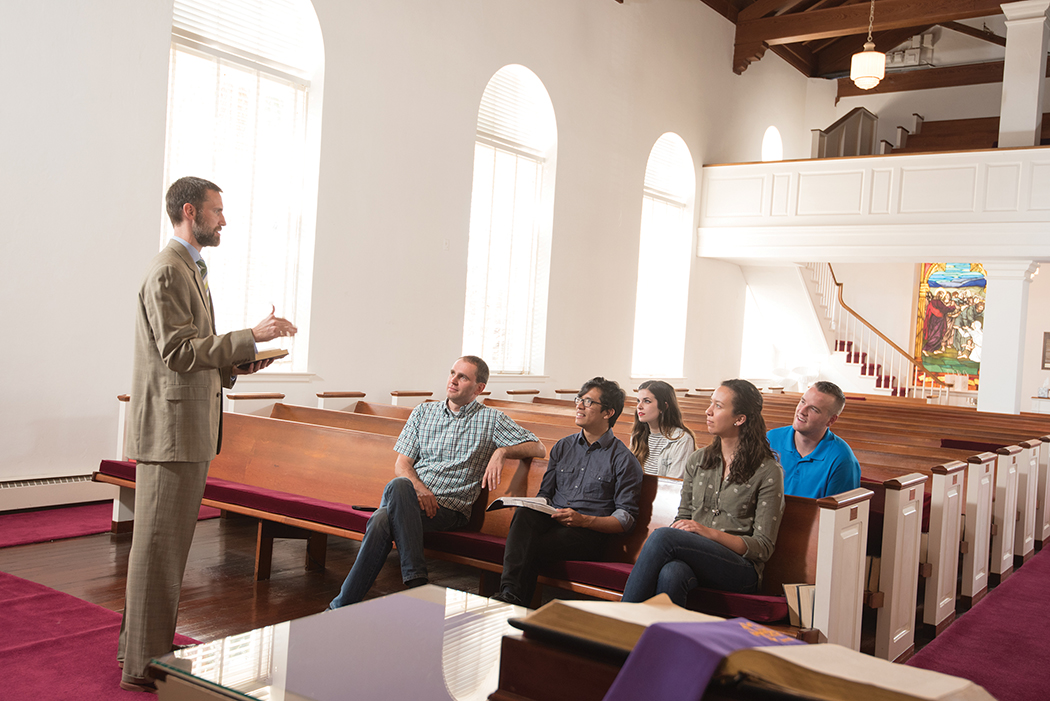 |
Justin Hardin, associate professor of Biblical and theological studies, teaches an M.Div. class in Memorial Presbyterian Church, located adjacent to the Palm Beach Atlantic campus.
Credit: John McKeith |
When they took that hard look, they discovered that educational programs had been pretty static for a long time. “Most institutions haven’t changed their general education program at the undergrad level for many decades,” he says. And the M.Div. program needed to be refreshed too, to enhance students’ preparation for ministry.
Perhaps they were ready for a change.
Hoag says that fewer and fewer students are willing to uproot their lives and spend three years in a residential seminary, and he thinks that the five-year plan results in a program of ministry preparation that is rigorous and “more seamless”— well thought out and cohesive.
The program is practical too. “It creates opportunities for field education and spiritual formation all the way through,” Hoag says.
No one is expecting that students like Andrew Sparks will become senior pastors at 23. Rather, the idea is to fill their ministry skill set sooner rather than later.
Indiana Wesleyan University
Eventually many of his program’s graduates will become lead pastors, says Edward Shigley, associate professor of religion and director of the Kern Ministry Program at Indiana Wesleyan University (IWU).
Shigley is convinced that the program’s alumni will be “better trained, more hireable, with less debt.” That’s their program’s tagline, and they believe it. “We believe you will be better equipped exiting this five-year program. You will be more hireable because you are better equipped, and we can get you out of here in five years with an M.Div., with less debt,” he says.
Shigley estimates the savings to students at nearly $30,000. IWU’s Kern Ministry Program is housed within the School of Theology and Ministry (which also offers a traditional M.Div.) and follows a 3 + 2 model — three years of undergraduate work flowing into two years at the graduate level.
“It’s a lot of work, and it’s pretty intense,” he says. “You take a four-year program and do it in three. You take a three-year and do it in two.”
Shigley believes the program addresses one of the drawbacks of a traditional M.Div. — that it’s not practical enough. Summer internships are required, and the fifth year of the program is spent in a 12-month residency at an approved “teaching church.” Shigley meets with cohorts weekly focusing on spiritual formation and leadership training.
Crown College
Five-year accelerated degree programs can also be done online. That’s the way the program has been organized at Crown College, a school based in Saint Bonifacius, Minnesota, that has a significant online presence. Dale Lemke is assistant professor of ministry leadership in the School of Online Studies at Crown, which received a $500,000 grant from Kern to facilitate the development of several programs, including an M.Div. that is launching this fall.
So how does the spiritual formation that is expected in a ministry master’s degree program take place for online students — especially those in an accelerated program?
It doesn’t, says Lemke.
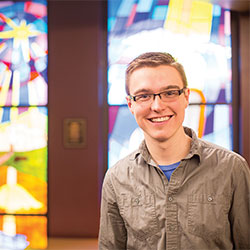 |
|
Ethan Linder, a Kern Ministry Program student at Indiana Wesleyan University.
Credit: Jer Nelsen
|
“For our online school, the basic philosophy is that spiritual formation happens within the context of real life and community where you are,” he says. “Rather than taking students out of their families and home communities and bringing them to a third environment, we want to thrust them back into their home environment to experience spiritual formation there.”
Crown is crafting a program that will allow students to apply to the accelerated program during their second semester of sophomore year.
Lemke concedes that some faculty were concerned about the maturity of the students. “That is one reason we decided to delay acceptance into the accelerated track — it gives us time to get to know them and discern their maturity and sense of calling.”
But maturity is not guaranteed in a 22-year-old any more than in a 19-year-old, he says. “That’s why we need to continue throughout the educational process to engage them in personal reflection.”
Accelerated programs are not novel, Lemke adds. “When you look across other academic fields, they are finding ways to consolidate and make education more efficient,” he says. “It’s for the good of the student; it reduces redundancy.”
Palm Beach Atlantic University
Jonathan Grenz remembers redundancy all too well. Grenz, who is director of the M.Div. program and associate professor of ministry leadership studies at Palm Beach Atlantic University, remembers using some of the same textbooks for his undergraduate degree in biblical studies and his master of divinity. So he is eager to cut that kind of repetition to allow students to save time and go deeper into their studies.
Palm Beach Atlantic’s Kern program follows the 3 + 2 model, with a distinct three-year undergraduate degree and a distinct intensive master’s program. “We are able to pick up students along the way, instead of recruiting them directly into the five-year program,” Grenz says.
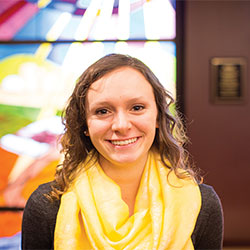 |
Elise Garverick, a Kern Ministry Program student at Indiana Wesleyan University.
Credit: Jer Nelsen |
He describes the accelerated program as having easy on-ramps and off-ramps, allowing students to come and go as they discern direction through their early years of study. His own son just graduated from the five-year program, but “not every 18-year-old has that sense of calling,” he says. “That’s why we needed it to be a bit more flexible at the beginning of the program.”
Grenz recognizes that graduates of the accelerated program are still young — too young to take on senior leadership in a congregation, but not too young for leadership. “They aren’t ready to be the solo pastor of a church,” he says. “Most of our graduates are going into associate pastoral roles. They graduate with a minimum of 600 hours of doing ministry. They are ready to give some leadership.”
Grenz thinks that the program’s graduates are more mature than typical 22-year-olds. They have been given years of ministry opportunities, he says, as well as intentional preparation. In fact, the program’s intensity and rigor mean that it’s not for everyone.
Midwestern Baptist Theological Seminary
“Lazy students need not apply.” That’s what it says on the website of Midwestern Baptist Theological Seminary in Kansas City. They named their program “Accelerate” and market it as “5 years, 2 degrees.”
John Mark Yeats is associate professor of church history at the seminary and dean of the seminary’s undergraduate division, Midwestern College. Yeats notes that preparing young people for ministry is hardly new. “Think of Charles Spurgeon,” he says. Spurgeon, the famed English Baptist preacher of the Victorian age, was only 19 when he was called to the pastorate of London’s largest Baptist congregation, New Park Street Chapel.
But we live in an age of “prolonged adolescence,” says Yeats. “We are working to counterbalance that, to create intensive cohort structures that intentionally place students in different frameworks with older, more mature students.” The goal is to help students become mature within a strong framework. As at Indiana Wesleyan, the Midwestern program’s fifth year is spent in field placement in churches. “We have partner churches, so their final year can be spent with a ministry surrounding them and giving them places to stretch their legs.”
Yeats says that he had been moving in this direction even before he became aware of funding from the Kern Family Foundation. “This has been on my heart as part of re-envisioning 21st-century theological education,” he says. “We need to rethink.” And it’s not like the program is easier —remember, no lazy students allowed. “We are not letting up any,” he adds. “They have to have a higher GPA, and they have to maintain it. It’s hard. It’s a pressure cooker.”
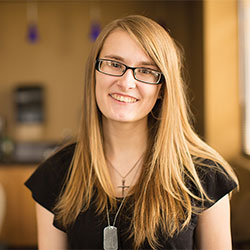 |
Victoria Watson Johns-Paradise, a Kern Ministry Program student at Indiana Wesleyan University.
Credit: Jer Nelsen |
Yeats is pleased with the Accelerate program’s progress. “We’ve exceeded what we expected,” he says. “Our target was 12 to 15 students a year. The first year we had 19. In the fall semester we are looking at 23.”
Preparing youth for long ministry
For three days this past June, the Kern Family Foundation welcomed the program directors from 17 different five-year pastoral degree programs to the foundation’s campus in Wisconsin for meetings, vision sharing and mutual encouragement. What emerged, at least on many campuses, was a view that this was an elite program—”a bit like the Navy SEALs, only for pastors,” says Josh Good. “Another strong theme was the partnership levels that exist with churches, and using existing pastors as mentors,” he adds.
The programs continue to look distinct from one another. “There have been as many different programs as there are schools,” Good says.
What the programs do have in common is the emphasis on youth: “We really emphasized the importance of recruiting 17- to 20-year-olds who could complete all their study by age 25,” he says. “But it has to take root in each school’s particular culture.”
Elisabeth Mackett, the program coordinator at the Kern Family Foundation, talks about that tool belt of ministry and how the early M.Div. fills it up. “They have their tool belt loaded. You may not use it all for a couple of years, but you have it ready. We see the five-year program as loading it up and getting them ready.”
The Kern Family Foundation continues to look for opportunities to expand the program to new seminaries, says Good. “We want to grow this program because we are encouraged by its early fruit.”
Frequently asked questions on the Kern-funded five-year programs
Q What challenges have schools encountered?
The intensity of the course load. “These are rigorous programs that are fitting a lot in. It’s a little like a Navy SEALs program, only for pastors,” says Josh Good of the Kern Family Foundation.
Sustainability of the programs. “If recruitment and retention are doing well, sustainability is generally going well,” says Kern’s Elisabeth Mackett. “I think the sustainability of recruiting and retention are the main challenges — the same things that are challenges for theological colleges in general.”
Q How many credit hours do students graduate with?
At least 120 undergrad hours. Most schools require 72 graduate-level hours for a master of divinity, and some go as high as 90 credit hours.
Q The Kern funding is for younger students, but can older students also enroll?
“The initiative aims at equipping younger students, from 18 to 20 years old, who know they want to become pastors,” says Good. “We encourage campus leaders to focus on that unique audience.”
Kern program requirements say that students should complete their studies by the age of 25. Some schools also choose to serve older students, but the initiative’s purpose is to prepare young pastoral leaders.
Free webinar
 The In Trust Center is offering a free webinar on five-year B.A./M.Div. programs on Wednesday, November 2, 2016, from 1 to 2 p.m. EST.
The In Trust Center is offering a free webinar on five-year B.A./M.Div. programs on Wednesday, November 2, 2016, from 1 to 2 p.m. EST.
The webinar will be led by Josh Good of the Kern Family Foundation, David Dockery of Trinity International University, John Mark Yeats of Midwestern Baptist Theological Seminary, and Mark Belokonny of Multnomah University.
To register or for more information: www.intrust.org/webinars.
An interview with James C. Rahn, president of the Kern Family Foundation

Q Why does the Kern Family Foundation want more seminaries to have five-year bachelor’s/master’s programs? Why does the foundation care?
The Kern Family recognizes that healthy churches led by strong, capable pastors impact spiritual development, character development, and human flourishing in a variety of ways. Churches are such important institutions. This program is about wanting to increase both the accessibility and affordability of seminary education. The current pathway to pastoral ministry — a four-year baccalaureate degree followed by three and sometimes four years of seminary training — means that some young people get distracted along the way. People who did sense a call to ministry may end up doing something else.
This program enables people who sense a call to ministry in their high school years to focus and get practical and formal training early on. The added benefit is that this program is much less costly for the students and their parents.
Q How do you respond to the objection that 18-year-olds don’t know what to do with their lives?
We’ve never claimed this is the one single path to ministry. But we think it is a path. Not everyone senses a call to ministry by 18, but there are those who do, as the survey data from the Association of Theological Schools indicates. For those students, this is an option.
We’re not saying there is not a place for the traditional M.Div. for second-career folks. We are saying that this is one more pathway to ministry. And if you look at other fields, like medicine, these kinds of programs are happening. If someone wanted to be a classical pianist or an Olympic athlete, for example, you wouldn’t tell them to wait until they were older to begin that path.
You don’t have to turn the clock back very far to when the bachelor of divinity was the norm for pastoral ministry preparation. It wasn’t until the post–World War II era, when having a bachelor’s degree no longer qualified the pastor as one of the better-educated people in the community, that we started adding on other educational requirements.
Q If a seminary leader is reading this, and says, “This sounds very interesting — I’d like to find out more,” then what’s the next step? Does the Kern Family Foundation want to hear from additional seminaries that are considering this kind of program?
The Kern Family Foundation is extremely interested and eager to work with additional institutions, board members, and presidents who would like to learn more about this program and pursue it. They should reach out to the Kern Family Foundation. We would love to be able to open this opportunity up for more young people.